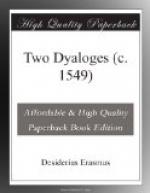wherof dothe your boke dyspose or intreate? dothe
it teache the art and crafte to drynke a duetaunt?
Poli. Take hede in goddes name what ye say
lest ye bolt out a blasphemie before ye be ware.
Canius. why bydde ye me take hede what I saye? is
there any holy matter in the boke? Poli. what
ma it is the gospell boke, I trow there is nothynge
can be more holye. Cannius. God for thy
grace what hathe Poliphemus to do withe the gospell?
||Poli. Nay why do ye not aske what a chrysten
man hathe to do with christe? Cannius. I
can not tell but me thynkes a rousty byll or a halbard
wold become such a great lubber or a slouyn as thou
arte a great deale better, for yf it were my chauce
to mete such one and knewe him not upon seeborde,
and he loked so lyke a knaue and a ruffya as thou
dost I wolde take hym for a pirate or a rouer upon
the see/ and if I met such one in the wood for an
arrante thefe, and a man murderer. Poli. yea
good syr but the gospell teache vs this same lesson,
that we shuld not iudge any person by his loke or
by his externall & outwarde apparaunce. For
lyke wyse as many tymes vnder a graye freers coote
a tyrannous mynde lyeth secretly hyd, eue so a polled
heed, a crispe or a twyrled berde, a frowninge,
a ferse, or a dogged loke, a cappe, or a hat with
an oystrich fether, a soldyers cassocke, a payre
of hoose all to cut and manglyd, may co||uer an
euangelycall mynde. Cannius. why not, mary
God forbyd elles, yea & many tymes a symple shepe
lyeth hyd in a wolfes skynne, and yf a man maye
credite and beleue the fables of Aesope, an asse
maye lye secretely unknowen by cause he is in a
lyons skynne. Poliphe. Naye I knowe hym
whiche bereth a shepe vpon his heed, and a sore
in his brest, to whome I wold wysshe with al my
hart that he had as whyte and as fauorable frendes
as he hathe blacke eyes. And I wolde wisshe
also that he were as well guylt ouer and ouer as
he hathe a colour mete to take guyltynge. Canni.
Yf ye take hym to were a shepe vpon his heed, that
weareth a cappe of woll, howe greuously than art
thou lodyn, or what an excedynge heuy burde bearest
thou then I praye the whiche bearest a hoole shepe
and an ostryche to vpon thy heed? But what
saye ye to hi doth not he more folyssly which beareth
a byrd vpon his heed, and an asse in his ||brest.
Poliphemus. There ye nypped & taunted me in
dede. Cannius. But I wolde saye this geere
dyd wonderous wel yf this gospel boke dyd so adourne
the with vertue as thou hast adourned lymmed, and
gorgiously garnysshed it with many gay goodly glystryng
ornamentes. Mary syr thou hast set it forth
in his ryght colours in dede, wolde to god it might
so adourne the with good codicios that thou myghtest
ones lerne to be an honest man. Poli.
There shall be no defaute in me, I tell you I wyll
do my diligence. Can. Naye there is no
doute of that, there shall be no more faute in you
now I dare say then was wonte to be. Poli.
Yea but (youre tarte tauntes, and youre churlysshe
checkes, and raylynges set asyde) tell me I pray




